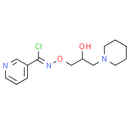Description
Bimoclomol is a heat shock protein (HSP) coinducer, used for treatment of cardiovascular diseases.
Product information
CAS Number: 130493-03-7
Molecular Weight: 297.78
Formula: C14H20ClN3O2
Chemical Name: (Z)-N-[2-hydroxy-3-(piperidin-1-yl)propoxy]pyridine-3-carbonimidoyl chloride
Smiles: OC(CO/N=C(\Cl)/C1C=NC=CC=1)CN1CCCCC1
InChiKey: NMOVJBAGBXIKCG-VKAVYKQESA-N
InChi: InChI=1S/C14H20ClN3O2/c15-14(12-5-4-6-16-9-12)17-20-11-13(19)10-18-7-2-1-3-8-18/h4-6,9,13,19H,1-3,7-8,10-11H2/b17-14-
Technical Data
Appearance: Solid Power
Purity: ≥98% (or refer to the Certificate of Analysis)
Shipping Condition: Shipped under ambient temperature as non-hazardous chemical or refer to Certificate of Analysis
Storage Condition: Dry, dark and -20 oC for 1 year or refer to the Certificate of Analysis.
Shelf Life: ≥12 months if stored properly.
Stock Solution Storage: 0 - 4 oC for 1 month or refer to the Certificate of Analysis.
Drug Formulation: To be determined
HS Tariff Code: 382200
How to use
In Vitro:
Bimoclomol (40 μM) significantly increases coronary flow (CF) in the period of normoxic perfusion (before ischemia). Bimoclomol significantly increases LVDP and CO, but it decreases LVEDP under ischemic conditions. Bimoclomol displays a biphasic effect on the rate of relaxation. Bimoclomol (>10 μM) causes concentration-dependent vasorelaxation, with EC50 value of 214 μM. Bimoclomol (100 μM) induces vasorelaxation also against 20 mM KCl. However, bimoclomol fails to relax preparations precontracted with serotonin, PGF2 or angiotensin II. Bimoclomol does not affect the stability of Hsp70 or its mRNA. Bimoclomol coinduces Hsp expression via the prolonged activation of the heat shock transcription factor (HSF-1). The effects of bimoclomol are abolished in cells from mice lacking HSF-1. Furthermore, bimoclomol can bind to HSF-1 and induce a prolonged binding of HSF-1 to the respective DNA elements. Bimoclomol (0.1, 1 and 10 μM) improves cell survival of rat neonatal cardiomyocytes compared to vehicle-treated cells. Bimoclomol (0.01 to 10 μM) significantly elevates HSP70 levels, based on the time of exposure. Pretreatment with bimoclomol for 24 h significantly increases survival of cells.
In Vivo:
Bimoclomol (1 and 5 mg/kg) decreases the ST-segment elevation induced by coronary occlusion by 56% and 80%, respectively, in anesthetized dogs.
Products are for research use only. Not for human use.
Payment & Security
Your payment information is processed securely. We do not store credit card details nor have access to your credit card information.


